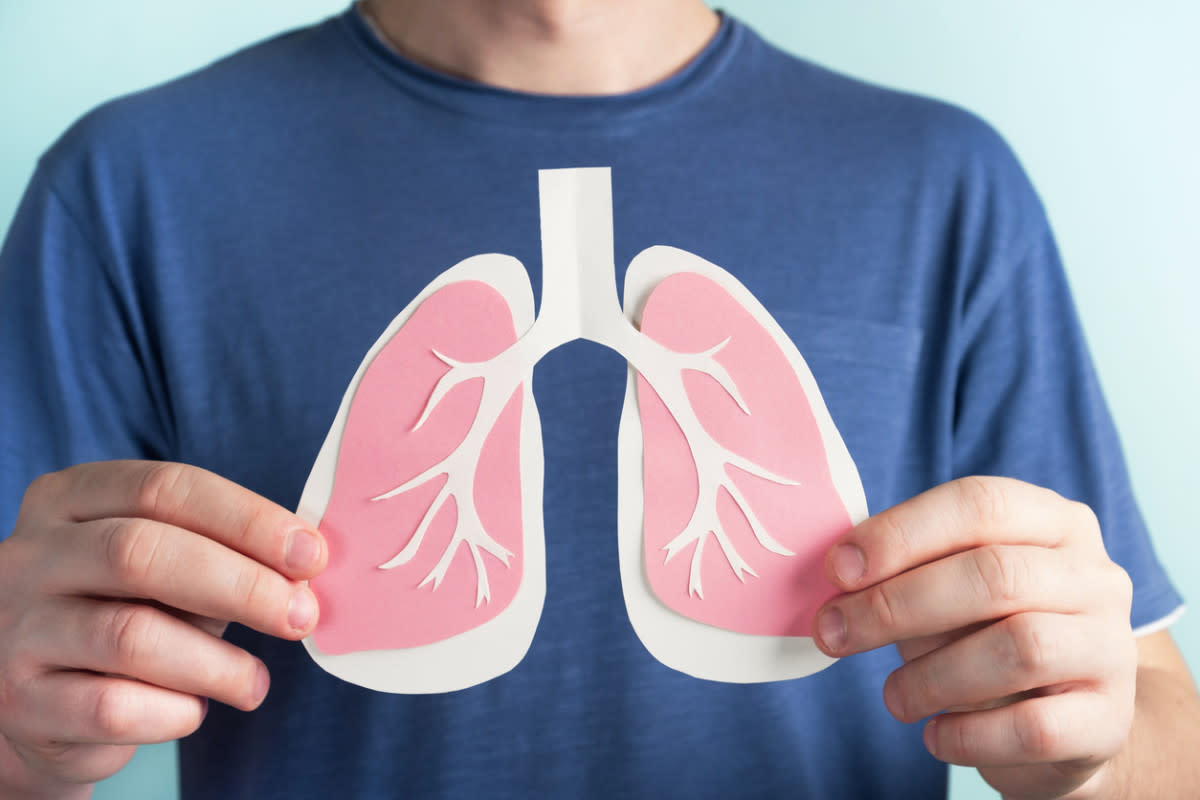‘I’m a Pulmonologist—This Is the #1 Workout I Swear by for Lung Health'

There are many benefits people can experience as a result of working out regularly. As one 2018 study reports, lifelong exercise is linked with improved longevity and delaying the onset of an astonishing 40 chronic conditions. Think: diseases like type 2 diabetes and cardiovascular disease.
While your mind might go to things like a healthy weight and better heart health, there are other gains that you may not think about when you exercise. For example, lung health. The average person may not ponder their lung health regularly, but for something that’s as important as breathing in and out, you may want to prioritize it just as much as the more frequently discussed aspects of your health. And as it turns out, there’s one form of exercise that can improve lung health more than any other type of workout.
What Is a Top Sign of Good Lung Health?
Dr. Paul S. Han, MD, Chief of Pulmonary Medicine, Holy Name Medical Center in Teaneck, NJ (Board Certified, Pulmonary Medicine, Critical Care, Sleep Disorders) says that if you’re aiming for excellent lung health, you should be on the lookout for normal breathing without a cough. “If you don't notice you're breathing, that's usually a good sign,” Dr. Han explains.
Related: TLC for Your Lungs: 15 Healthy Ways to Keep Your Lungs in Tip-Top Shape
What Can Cause Poor Lung Health?
On the other end of the spectrum, some things can cause less-than-optimal lung health. Dr. Han says that smoking is the most obvious, and most common, problem that can decrease the health of your lungs. He lists other exposures that can also be dangerous to one’s lungs, and they include radon exposure, occupational exposures (hazardous substances being breathed in workplace air) and poor air quality, which can cause breathing issues, particularly when it’s coupled with underlying asthma.
“Poor lung health can be indicated by shortness of breath or cough,” Dr. Han says, adding that one symptom that’s often overlooked is unrefreshing sleep or fatigue. “Some patients have low oxygen levels only when sleeping,” he notes.
The Workout Dr. Han Swears by for Lung Health
So, what’s the must-do workout if you want to boost your lung health? It’s not as time-consuming or intense as you might think.
“Just walking regularly is important for lung health,” Dr. Han says. “That helps improve lung expansion as well as preserving exercise capacity,” he continues, using the metaphor that if a car isn’t driven, after a while, it can be difficult to start.
If you want to stick to a lung-improving walking regimen, Dr. Han says that you can simply adopt this guideline: get at least 150 minutes of moderate aerobic activity per week, and guess what? Walking counts when logging these minutes.
Related: 'I'm a Pulmonologist, and This Is the Daily Habit I Swear By for Lung Health'
What Are Other Things That Can Improve Lung Health?
While walking is certainly beneficial for lung health, there are other things you can do to ensure your lungs are in good working order.
For instance, Dr. Han says that it’s key to get the following vaccinations to maintain optimal lung health: an annual flu vaccine, a regular COVID vaccine, Prevnar-20 if you’re over age 65 (this one protects against 20 different types of bacteria known as Streptococcus pneumoniae) and an RSV vaccine if you’re over 65.
In addition, Dr. Han advises that you can maintain an efficient immune system by doing the things your body needs—that means getting plenty of sleep and paying attention to your diet.
Next up, discover more signs that your lungs may not be healthy.
Sources
Paul S. Han, MD, Chief of Pulmonary Medicine, Holy Name Medical Center in Teaneck, NJ.
Cold Spring Harbor Perspectives in Medicine: “Health Benefits of Exercise”
